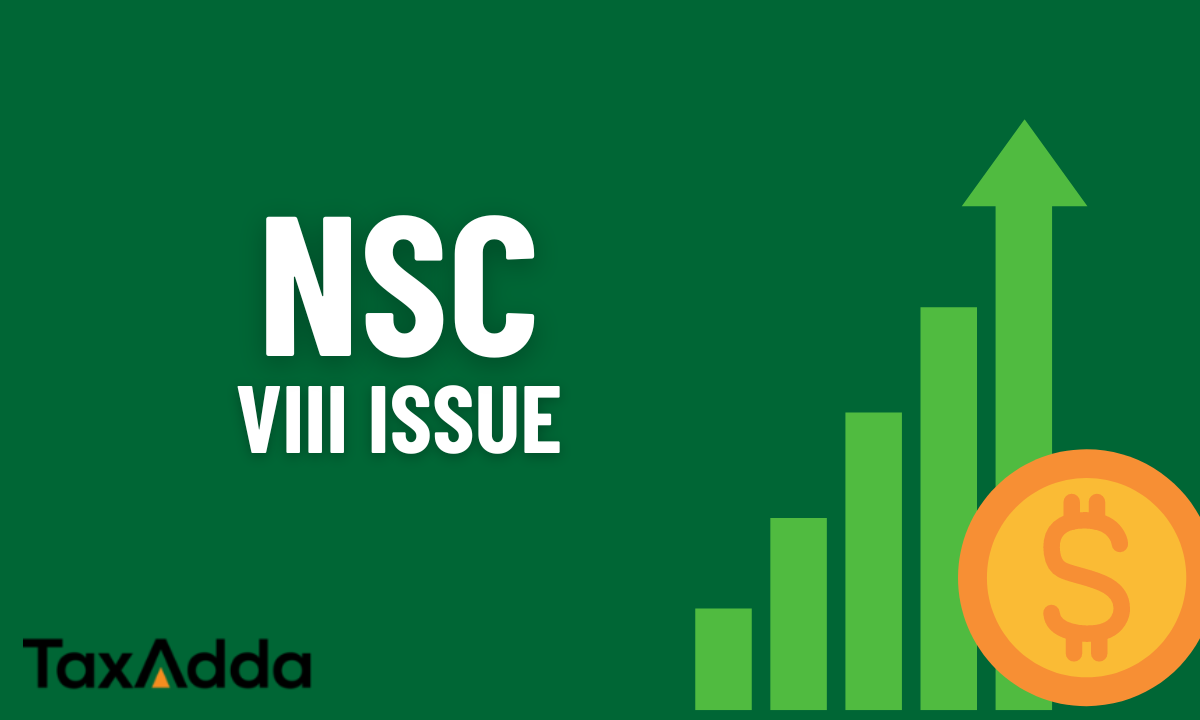National Saving Certificate, commonly known as NSC, is saving bonds issued by Indian Government to individuals only. It is primarily focused on small savings. Also, the amount invested in NSC, can be claimed as tax deduction investment u/s 80C of Income Tax Act, 1961 subject to limit specified.
Features of NSC VIII Issue
- Certificate are issued at Par.
- Minimum investment is of Rs 1,000. Available denomination are Rs 100, Rs 500, Rs 1,000 & Rs 10,000.
- Amount invested in NSC can be claimed as investment u/s 80C. Also the accrued interest on NSC (except the interest for maturing year) will qualify for investment u/s 80C. So, the maximum deduction which can be claimed for NSC (investment and interest) is Rs 1,50,000.
- There is no maximum limit of investment. You can have multiple NSC’s.
- Maturity period is of 5 years.
- Interest rate for first quarter of FY 2024-25 is 7.70% per annum.
- No tax deduction as source (TDS).
- Only individuals are allowed to purchase investment. Trust, HUF etc are not allowed to make investment.
- NSC can be pledge as collateral security for getting loan from bank.
- NSCs can also have joint holders or an adult can purchase an NSC on behalf of a minor.
- A single holder type account may also be opened by a minor on attaining the age of 10 years.
- Joint ‘A’ Type account may be opened by up to three adults payable to both the holders jointly or to the survivor.
- Joint ‘B’ Type account may be opened by up to three adults payable to either of the survivor.
Interest on NSC VIII Issue
| Year & Period | Rate of interest (Compounded annually) |
| FY 2024-25 (Q2) | 7.7% |
| FY 2024-25 (Q1) | 7.7% |
| FY 2023-24 (Q1, Q2, Q3 & Q4 ) | 7.7% |
| FY 2022-23(Q4) | 7.0% |
| FY 2022-23(Q1, Q2 & Q3) | 6.8% |
| FY 2021-22 (Q1, Q2, Q3 & Q4 ) | 6.8% |
| FY 2020-21 (Q1, Q2, Q3 & Q4 ) | 6.8% |
| FY 2019-20 (Q4) | 7.9% |
| FY 2019-20 (Q3) | 7.9% |
| FY 2019-20 (Q2) | 7.9% |
| FY 2019-20 (Q1) | 8.0% |
Source – NSIIndia (click to view NCS rates since 1990)
Is NSC Interest Taxable?
Amount invested in NSC can be claimed as investment u/s 80C. Also the accrued interest on NSC is taxable first and further, will qualify for investment u/s 80C. Only interest accrued in the year of maturity is taxable because it is not going to be reinvested in the year of maturity & onwards.
It means if your Investment u/s 80C is less than Rs.150000/-(excluding NSC interest) then NSC interest will not be taxable as you will get deduction of Accrued NSC interest u/s 80C & if it is already equal to or exceeding the Rs.150000/- (excluding NSC interest) limit then NSC interest is taxable for you.
Remember you can take deduction of NSC Interest if available but NSC interest is not exempt from tax under any section.
Documents required for NSC purchase
To Invest in NSC (National Savings Certificate), you need to visit nearest post office with the following documents:
- NSC application form.
- Original identification proof such as:
- Passport
- Permanent Account Number (PAN Card)
- Voter ID
- Driving license
- Senior Citizen ID, or Government ID for verification.
- Photograph
- Address proof such as an electricity bill, passport, telephone bill, bank statement etc.
- Cash or cheque.
Premature Closure of NSC
Premature withdrawal is allowed only in special cases i.e.
- on the death of the holder or any of the holders in the case of joint holders
- on forfeiture by a pledgee being a Gazetted Government Officer when the pledge is in conformity with these rules
- when ordered by a court of law
Only principal amount is repaid if the certificate is encashed within one year from the date of deposit. If the encashment is done after expiry of one year but before the expiry of three year from the date of deposit then simple interest is payable only for the complete month at the rate applicable from time to time to single accounts under Post Office Saving Account Rules, 1989 and Post Office Saving Account Rules, 2019.
Calculation of Maturity Value of NSC
Value of investment with accrued interest (assumed 7.7% for 5 years) on a certificate of Rs 1,000 denomination will be as follows: –
| Year | Accrued Interest | Total Value |
| 1 | 77.00 | 1,077.00 |
| 2 | 82.93 | 1,159.93 |
| 3 | 89.31 | 1,249.24 |
| 4 | 96.19 | 1,345.44 |
| 5 | 103.60 | 1,449.03 |
| Total | 449.03 |
NSC IX Issue (Discontinued)
From 1.12.2011, 10 Year National Savings Certificates (IX Issue) were made available for purchase through Departmental Post Offices and other post offices as may be permitted by Heads of Circles working in Savings Banks. The sale of these certificates was discontinue from 20 December2015. The certificate was available in the 100/-, Rs. 500/-, Rs. 1000/-, Rs. 5000/- and Rs. 10,000/- and the scheme was issued to the individuals only with effect from 1.12.2011 to 19.12.2015. The 10 Year National Savings Certificates (IX Issue) had a ten-year maturity period starting on the date specified on the certificate.
FAQ
What if I lost my NSC certificate?
If a certificate is lost, stolen, destroyed, mutilated or defaced, the person entitled thereto may apply for the issue of a duplicate certificate to the post office where the certificate is registered or to any other post office in which case the application will be forwarded to the post office of registration. It is suggested that you should keep a xerox & soft copy of NSC for making this process easy.
What if I don’t encash my NSC after 5 years?
You cannot renew NSC after the end of the five-year tenure. If the NSC maturity proceeds are not withdrawn by an account holder, the scheme becomes available for post office savings scheme interest for 2 years.
Can a Non-Resident invest in NSC?
Non-residents cannot invest in National Saving Certificates. However, if a resident holding an NSC certificate becomes an NRI, then they can hold the certificates till maturity.
What is best among NSC, FD and PPF?
NSC, FD & PPF, all the three investment options are safe Investments. One need to consider the interest rates, lock-in period & withdrawal rules as per his individual needs. If you are looking for a shorter investment period due to upcoming financial need, NSC might be the better option due to its 5-year maturity.
Can holders add nominees in an NSC?
Yes, nominees can be added in an NSC.
What are the modes of payment that can be made towards the NSC?
Payments can be made via demand draft, order, cheque, or cash.
When NSC interest is taxable?
You are required to report NSC interest at the time of accrual (at the end of each completed year of the NSC) in your income tax return. Reporting whole interest at the time of maturity should be avoided.
Can I buy NSC online?
Yes, it can be purchased online via Department of Post Office e-banking.


